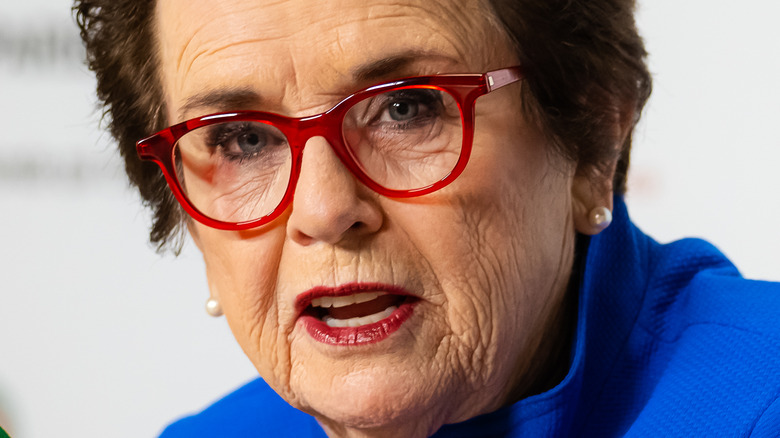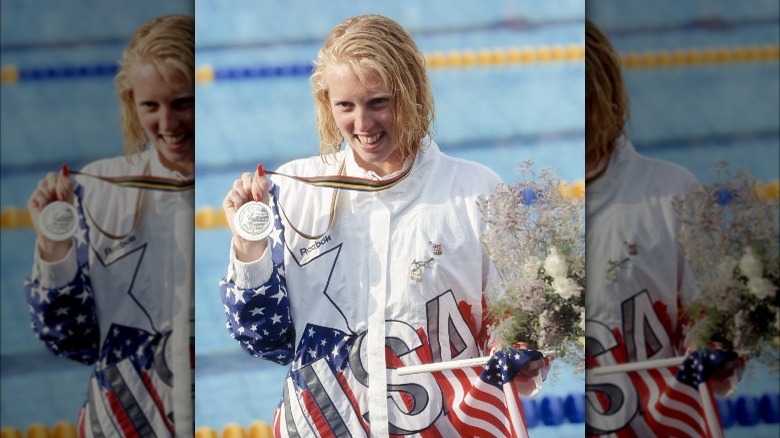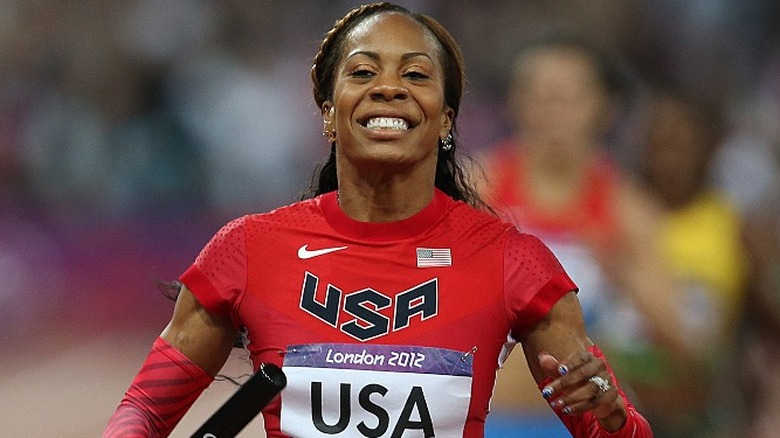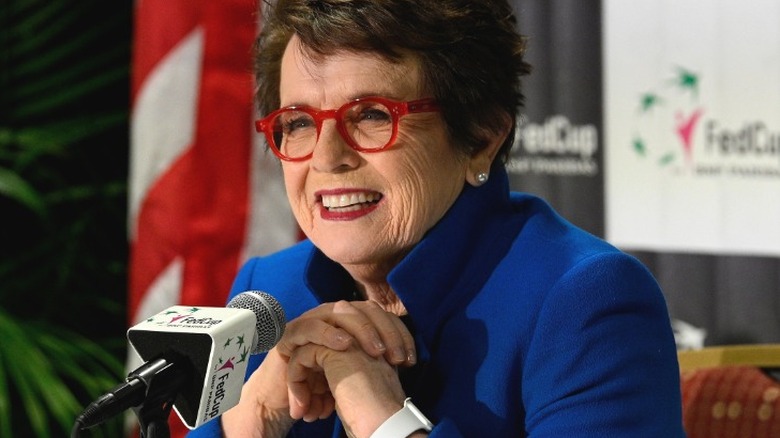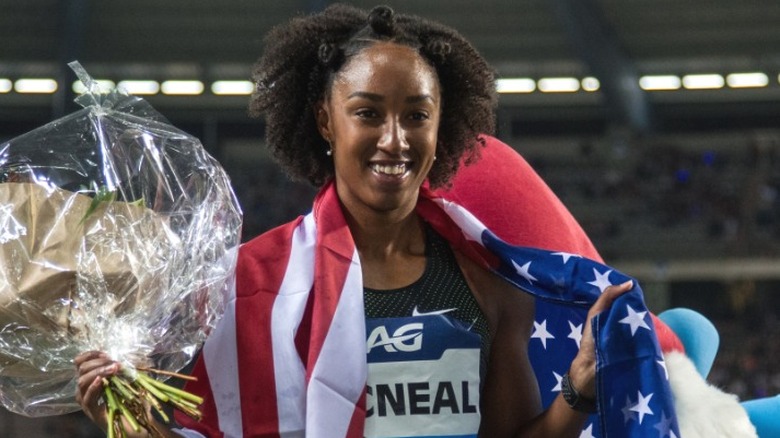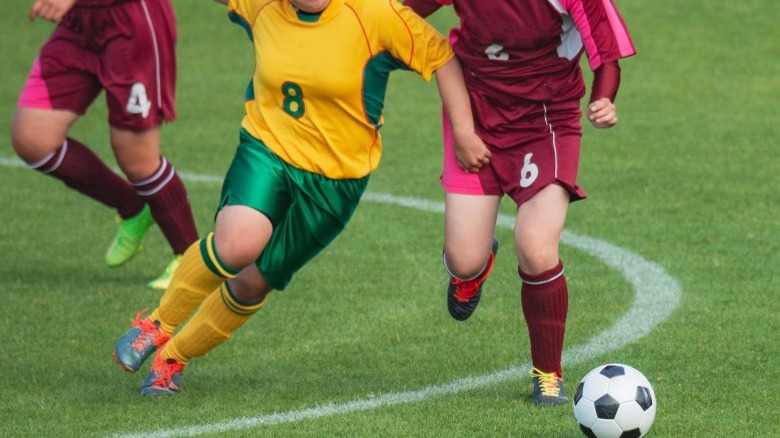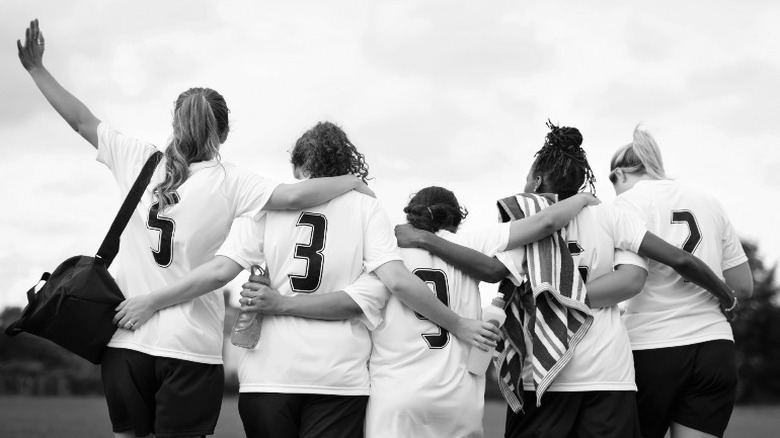Athletes Who Got Honest About Their Abortions
The following article includes brief mentions of mental health issues, suicidal ideation, and sexual assault.
In June 2022, the Supreme Court of the United States of America overturned Roe v. Wade, the landmark decision that made abortion legal in 1973. One of the dissenting justices wrote that after the ruling, "Young women will come of age with fewer rights than their mothers and grandmothers had," per USA Today. Many female athletes have spoken about how this loss of rights will affect them, but the limitation of rights also extends beyond women. As trans athlete Schuyler Bailar noted (via CBS News), "This is a women's issue, and it is also a transgender man's issue. It is also a nonbinary person's issue. ... This is about all of us."
Reproductive rights are essential for athletes whose careers depend on their bodies. Nearly a year before the Supreme Court overturned Roe v. Wade, more than 500 athletes came together to ask the judicial branch of government to protect abortion rights. In the amicus brief, the athletes wrote, "If the State compelled women athletes to carry pregnancies to term and give birth, it could derail women's athletic careers, academic futures, and economic livelihoods at a large scale. Such a fundamental restriction on bodily integrity and human autonomy would never be imposed on a male athlete, though he would be equally responsible for a pregnancy."
Let's take a closer look at athletes who have come forward to share their personal experiences with abortions.
Crissy Perham
Crissy Perham is a silver and two-time gold medalist in Olympic swimming, per the Washingtonian. The Olympian was also one of many sports stars to share their story in the abovementioned Supreme Court brief about athletes and reproductive rights.
"When I was in college, I was on birth control, but I accidentally became pregnant. I was on scholarship, I was just starting to succeed in my sport, and I didn't want to take a year off. I decided to have an abortion," she explained in the official document. "I wasn't ready to be a mom, and having an abortion felt like I was given a second chance at life."
When Perham first got the news of the 2022 Supreme Court decision, she was shocked and worried, along with the majority of Americans. In an interview with TIME, she said that while she understands not everyone shares her views on why access to abortion is important, she believes having the option is a fundamental right. "I never want to sound like I need anybody to think like me," the athlete explained. "What I would respectfully ask is that you allow someone with a uterus to decide what's best for them and their uterus."
Sanya Richards-Ross
Olympic track star Sanya Richards-Ross shared her abortion story in her 2017 memoir "Chasing Grace," explaining that she had undergone the procedure right before the Beijing Olympics in 2008. In the book, she wrote, "The culmination of a lifetime of work was right before me. In that moment, it seemed like no choice at all. The debate of when life begins swirled through my head, and the veil of a child out of wedlock at the prime of my career seemed unbearable."
Richards-Ross struggled with the decision, particularly as a Christian. She detailed the physical, psychological, and spiritual struggle she experienced after the abortion and said it took a long time to recover, especially without a solid support group. Her solution has been to bring the topic to the forefront of conversation. In an interview with ESPN, Richards-Ross explained, "I think there are lots of young girls who experience this, especially female athletes. I look forward to having more discussions about it and helping young women heal from it."
Indeed, it's a decision that a lot of young athletes seem to make, more than we might imagine. "I literally don't know another female track-and-field athlete who hasn't had an abortion, and that's sad," Richards-Ross told Sports Illustrated Now. She attributed the high rate of accidental pregnancies to misinformation and emphasized the importance of reproductive education to help young athletes who are put in the position she once was in.
Billie Jean King
Billie Jean King is a tennis legend. In 1971, she was climbing towards the top of her career when she learned she was pregnant. "It was unexpected. I was 27 years old and the top-ranked women's tennis player in the world," the Hall of Famer wrote in a 2021 op-ed for The Washington Post. She decided to terminate the pregnancy. Not only was her tennis career blossoming, but King was also balancing her work obligations with just figuring out her identity as a member of the LGBTQ+ community. "The reason I had an abortion is because I was not in a good place. ... I was trying to figure my life out," she told "Makers" (via People).
Though abortion was legal in the state of California then, King had to go to great lengths to get approval for the procedure. "Arguing to a dozen or so people I had never met why I qualified for an abortion remains one of the most degrading experiences of my life," she wrote in The Washington Post.
The tennis icon also had to get permission from her then-husband, sports promoter Larry King, as that was the law at the time. Luckily, he was supportive despite the fact (or perhaps because) their marriage was on the rocks. However, calling this requirement an "indignity," she added, "Men remained in charge of not just financial matters but even the right to govern my own body."
Brianna McNeal
Olympic runner Brianna McNeal was physically and mentally recovering from an abortion when she missed an appointment for a procedural doping test in 2020. The missed test resulted in a suspension from participating in sporting events and a five-year ban from the Olympics, per USA Today. "I tried to keep the abortion private, but they just kept tugging and tugging at me, wanting more information," the athlete told The New York Times. "... I just don't believe that this warranted a suspension at all, much less a five-year suspension, for just a technicality, an honest mistake during a very emotional time," she added.
McNeal claimed that her mental health should have been taken into account, but instead was ignored. "They were wrapping me up into this person, this criminal mastermind, that I am not. It was heartbreaking to have to deal with this whole case and the insensitivity," she told Salon. The media outlet reported that McNeal partly attributed the mistreatment to systemic racism and the stigma surrounding abortion.
If you or someone you know needs help with mental health, please contact the Crisis Text Line by texting HOME to 741741, call the National Alliance on Mental Illness helpline at 1-800-950-NAMI (6264), or visit the National Institute of Mental Health website.
Keeping scholarships is a big concern for student athletes
Pregnancy requires taking time off from athletic endeavors, which for student athletes, can mean losing scholarships — and thus, losing their access to higher learning. As the previously mentioned athletes explained in the Supreme Court amicus, "For a student athlete, being pregnant, taking the necessary recovery period, and having likely-changed physical capacities — as well as the realities parenthood would impose on a student — could easily derail not only her potential athletic career, but also her future educational and professional opportunities."
Having the legal option for abortion has allowed many student athletes to keep their scholarships and continue on their career paths. At the same time, some athletes feel there is no other option. A student athlete attending Clemson University told ESPN in 2007, "I have a couple teammates that have had abortions due to the fact that they knew they weren't going to get their scholarship back. ... But like an actual teammate having a child, and coming back and earning a scholarship, that's a situation that hasn't happened." Recounting her experience, she said losing her scholarship was the main reason she decided to have an abortion.
In a piece about the lack of legal protections for pregnant athletes, professional runner Phoebe Wright told The New York Times, "Getting pregnant is the kiss of death for a female athlete." Thus, several athletes have argued that there should also be better policies in place to support students and professionals who do want to carry a pregnancy to term in order to ensure that they do not lose access to education or sponsorships.
Athletes who have shared their abortion experiences anonymously
In the previously mentioned 2021 Supreme Court amici curiae, many athletes shared their personal stories about receiving abortions, though they chose to remain anonymous. For instance, a soccer pro wrote, "I accidentally became pregnant in college due to a failure in my birth control. ... I decided to have an abortion to ensure I could continue to pursue my collegiate and professional soccer career." Though she miscarried before having the procedure, knowing she had that freedom and flexibility allowed her to feel in charge of her own destiny.
Other athletes in the amicus brief raised an important point concerning the effects of sexual violence and how abortion can act as a safety net after a traumatizing experience. An anonymous Division 1 field hockey player explained, "Knowing that safe, regulated abortion would be an option of mine if necessary prevented some of the stresses that came along with being a rape victim." Meanwhile, a lacrosse player who had a similar experience with sexual assault wrote, "I emotionally and physically depended on lacrosse, and I wouldn't have been able to handle a pregnancy, school, and my sport at the same time. If I did not have the option to abort, I would have certainly taken my own life."
All of these athletes' stories and outlooks sought to illuminate how important it is for everyone to have the constitutional right to control their own bodies.
If you or anyone you know has been a victim of sexual assault, help is available. Visit the Rape, Abuse & Incest National Network website or contact RAINN's National Helpline at 1-800-656-HOPE (4673).
If you or anyone you know is having suicidal thoughts, please call the National Suicide Prevention Lifeline by dialing 988 or by calling 1-800-273-TALK (8255).

